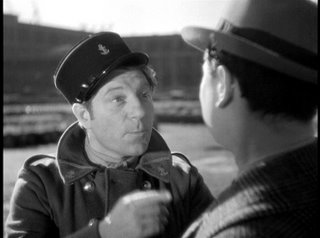Canonball #989: Port of Shadows
 France, 1938
France, 1938Starring Jean Gabin, Michèle Morgan, Michel Simon, Pierre Brasseur
Adapted by Jacques Prévert with Marcel Carné from the novel by Pierre Dumarchais
Directed by Marcel Carné
Gabin is a deserter; he hitches to Le Havre looking for a ship out; he gets distracted into trying to rescue Morgan from her thuggish boyfriend Brasseur and her shifty protector Simon. Everyone says this isn't nearly as good as the next Carné-Prévert collaboration, Le Jour se lève (which I haven't seen). It certainly doesn't approach Children of Paradise, but it has its merits. In the "poetic-realist" tradition, its ideas of poetry and realism, as with most non-Renoir French movies of the era, are pretty 19th century. There are occasional lovely, foggy exteriors by the harbour, but the over-reliance on sets and the woe-is-woe fatalism -- "for example, if I see a swimmer, immediately I think he's going to drown, so I paint a drowned man" -- seem about as poetic-realist as an old country song.
But just as George Jones could transform bad songs into great art, the actors here transform a moderately bad scenario into moderately great art. The teenaged Morgan, in her famous see-through raincoat, brings a glamorous world-weariness to her role as the coy mistress. And ah, Le Jean. Along with Pépé le Moko, this is one of his definitive roles (not his best -- Grand Illusion, duh), representing a break with theatrical styles of acting. His kind, hotheaded, screwed Everyman doesn't have to overemote because he's so clearly flesh-and-blood, so close. As Renoir said:
"Gabin was at his most expressive when he did not have to raise his voice. Magnificent actor that he was, he got his greatest effects with the smallest means... Gabin could express the most violent emotion with a mere quiver of his impassive face where another man had to shout to get the same effect."
Actually, Renoir hated this movie. And it's true that it's out of balance: it accepts the triumph of authority without really getting pissed off about it. But I forgive it for a bedroom scene in which Gabin and Morgan allow their characters to believe they're gonna make it after all. We might know better, but that fragile moment is wise nonetheless.
A MINUS

0 Comments:
Post a Comment
<< Home